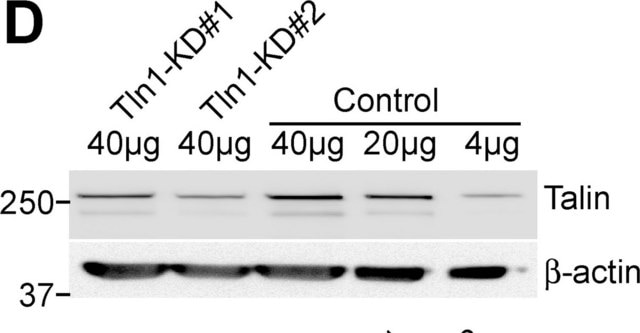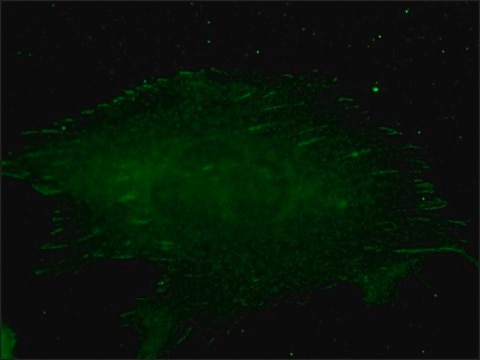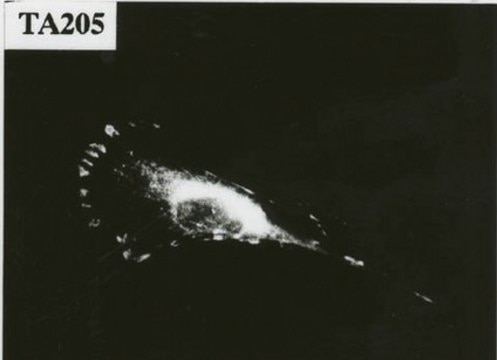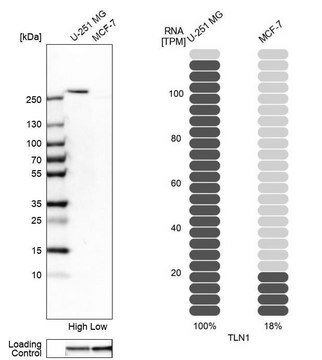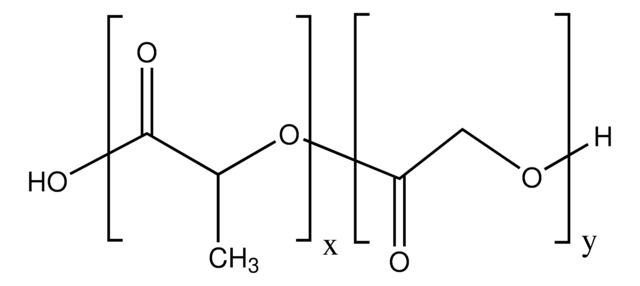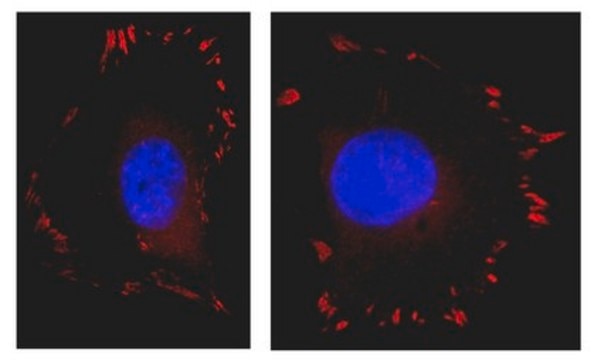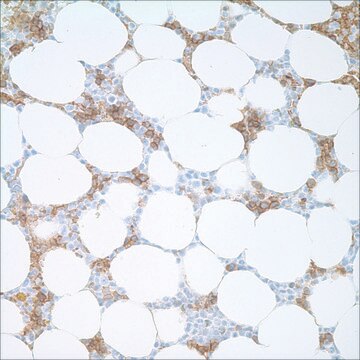General description
Monoclonal Anti-Talin (mouse IgG1 isotype) is derived from the hybridoma TA205 produced by the fusion of mouse myeloma cells and splenocytes from mice immunized with partially purified preparation of human platelet talin. Talin is present in areas of cell-substratum and cell-cell contacts. Two types of talin were found in human, talin 1 and talin 2. Talin 1 co-distributes with integrins in the cell surface membrane. The C-terminus comprises binding sites for proteins such as β-1-integrin, actin, and vinculin. The N-terminus of the protein consists of elements for localization to cell extracellular matrix junctions. Talin 2 has a different pattern of expression compared to talin 1, but talin1 associates with unique transmembrane receptors to form novel linkages between extracellular matrices and actin cytoskeleton.
Talin 1 (TLN1) gene mapped to human chromosome 9p13.3, codes for a 270kDa cytoskeletal protein containing 2541 amino acids. Talin-1 is widely expressed in the kidney, liver, spleen, stomach, lung and vascular smooth muscle. The TLN1 antiparallel dimeric structure is characterized with a globular head containing four-point-one, ezrin, radixin, moesin (FERM) domain and rod domain involved in dimer formation.
Immunogen
partially purified preparation of human platelet talin
Application
Monoclonal Anti-Talin antibody produced in mouse has been used in western blotting and immunostaining.
Monoclonal Anti-Talin antibody produced in mouse has been used in:
- Immunoprecipitation
- immunofluorescence
- immunocytochemistry
Biochem/physiol Actions
Talin 1 (TLN1) is a cytoskeletal protein, which plays a vital role in cancer cell adhesion, migration and invasion. It is also involved in integrin activation and it facilitates the adhesion of integrin to actin cytoskeleton. TLN1 might act as a potential prognostic biomarker in nasopharyngeal carcinoma (NPC). Overexpression of TLN1 is observed in endometrioid carcinoma, oral squamous cell carcinoma (OSCC), prostate cancer and hepatocellular carcinoma. Serum TLN1 functions as a potential biomarker of hepatocellular carcinoma (HCC). Talin 1 (TLN1) is highly expressed in glioblastoma multiforme (GBM). The inhibition of TLN1 activity helps in diminishing malignant features of GBM cells. It also plays an important role in regulation of, Bevacizumab (anti-angiogenic agent) -resistance.
Talin 1 assists in the attachment of adherent cells to the extracellular matrix and of lymphocytes to other cells. It plays an important role in the assembly of actin filaments and in spreading and migration of different cell types, such as fibroblasts and osteoclasts.
Target description
Talin is a cytoskeletal protein that is found concentratedin areas of cell-substratum and cell-cell contacts. Theencoded protein plays a significant role in the assemblyof actin filaments and in spreading and migration ofvarious cell types, includ
Physical form
Solution in 0.01M phosphate buffered saline pH 7.4, containing 15 mM sodium azide.
Disclaimer
Unless otherwise stated in our catalog or other company documentation accompanying the product(s), our products are intended for research use only and are not to be used for any other purpose, which includes but is not limited to, unauthorized commercial uses, in vitro diagnostic uses, ex vivo or in vivo therapeutic uses or any type of consumption or application to humans or animals.
